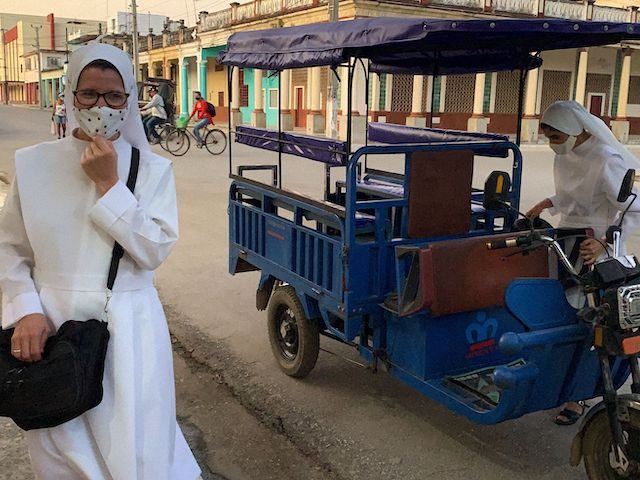Catholic priests and nuns were among the most visible members of society participating in protests against the communist regime of Cuba on Monday, the largest single day of pro-freedom protests since July.
A group of anti-communist dissidents called for the Cuban people to take the streets peacefully on November 15 and demand a change in the 62-year-old brutal dictatorship. To punctuate their good faith attempt at peaceful assembly, the group attempted to obtain a legal permit for the march, which the regime denied in October. In anticipation of the protests, the Castro regime organized dozens of “acts of repudiation” – state-orchestrated mob attacks against the homes of known dissidents – and mobilized the “Committees for the Defense of the Revolution” (CDRs), localized civilian spy networks used to intimidate dissenters into silence.
The Cuban regime reacted disproportionately to the call for protest, imposing broad house arrest protocols on known dissidents to prevent the day from resulting in protests as large as those on July 11. That day, human rights groups estimate that 187,000 people across the country organized protests demanding an end to communism. Dissidents estimate that the regime arrested thousands of people – many of them minors, some of them bystanders who were not protesting at the time – and many remain missing at press time.
The threats failed. Widespread reports from the island revealed large numbers – though human rights groups have yet to tally totals – of people dressed in white and handing out flowers, a form of protest dissidents adopted on a large scale from the Ladies in White, a group of women who protest weekly for the freedom of their loved ones, who are prisoners of conscience. An increasingly large number of Catholic priests and nuns have become fixtures of the protest movement and joined the “counter-revolutionaries” on Monday.
In the city of Bejucal, about 16 miles from Havana, priests and nuns dressed in white marched peacefully after organizing on social media:
Qué valientes las Hijas de la Caridad, los sacerdotes y pastores de la Iglesia que han salido a las calles para acompañar al pueblo #15NCuba #PatriaYVida
Posted by Mario J. Pentón on Monday, November 15, 2021
Priests were also visible participants in protests in Havana, marching and blessing the protesters:
“While the regime kept activists, journalists, and Cuban opposition members under house arrest, nuns and priests defied the prohibitions,” the Catholic news site Aleteia reported. “They did it by meeting in plazas and public streets where the detained protesters were going to meet.”
“Greetings and blessings. Just as you see me here I went out to walk for the people and hand out flowers, first to the police and then to the women I saw on the street,” Father Kenny Fernández Delgado wrote on social media, sharing a photo dressed in white in solidarity with the anti-communist movement.
Fernández Delgado is among a group of priests who received state threats and were subject to “acts of repudiation,” according to multiple reports on the ground, making their participation particularly impressive.
“It has just been communicated to me that they called from the Office of Religious Affairs to inform that they are aware of the intention of Fathers Rolando Montes de Oca y Castor Álvarez Devesa to participate tomorrow in the November 15 protest together with our people,” Father Alberto Reyes Pías said in a video posted to Facebook on Sunday. “And they informed that, if we participate in the protest, we will be detained. We are priests to preach the Gospel, and the Gospel of Jesus Christ speaks of freedom, of justice, of truth – that is what our people are asking for.”
“If being detained is the price of being coherent with preaching the Gospel, then so be it. God willing, tomorrow we will be accompanying our people,” Reyes promised.
The Castro regime responded to the video by staging an “act of repudiation” mob harassment attack outside of the priest’s home on Sunday night. Locals shared video images of an aggressive crowd wearing red, the color of communism, and shouting threats and insults in front of the priest’s home. The attack also reportedly targeted Wilfredo Pino, the archbishop of Camagüey who was present in the home at the time.
Communist regime sympathizers also proudly shared a video of the street harassment.
Aquí les comparto una imagen de la publicación de algunos represores que honraron al arzobispado de Camaguey con un acto…
Posted by Fernando Gálvez on Monday, November 15, 2021
Aleteia noted that Reyes, as well as the two priests he mentioned in his video, all participated in the protests, anyway. For Father Álvarez, the protests marked a return to the streets after his brutal assault and arrest on July 11. A peaceful participant in the protests that day, Álvarez went missing for days after receiving a public beating at the hands of state security officials that left him with a significant head wound. Police also dragged him through the streets, witnesses said, before stuffing him in a police car and taking him away.
Álvarez, Reyes, Montes de Oca, Fernández, and eight other priests published a letter last week urging the regime not to respond to this week’s protests with violence.
“We do not want to return to police beating and mistreating their own people,” the priests wrote. “We don’t want a return to bloodshed; we don’t want to hear gunshots. No, because that is not the path that will bring us to the Cuba that we need and that we all want.”
Cuba is a communist, by definition, atheist regime that has persecuted its Christian population for decades. While the past three popes have maintained cordial, if distant, relationships with the Castro regime, priests on the ground in the island have often defied the tepidness of the Catholic Church’s leadership in the last over half a century, calling for organized action to liberate the country.

COMMENTS
Please let us know if you're having issues with commenting.